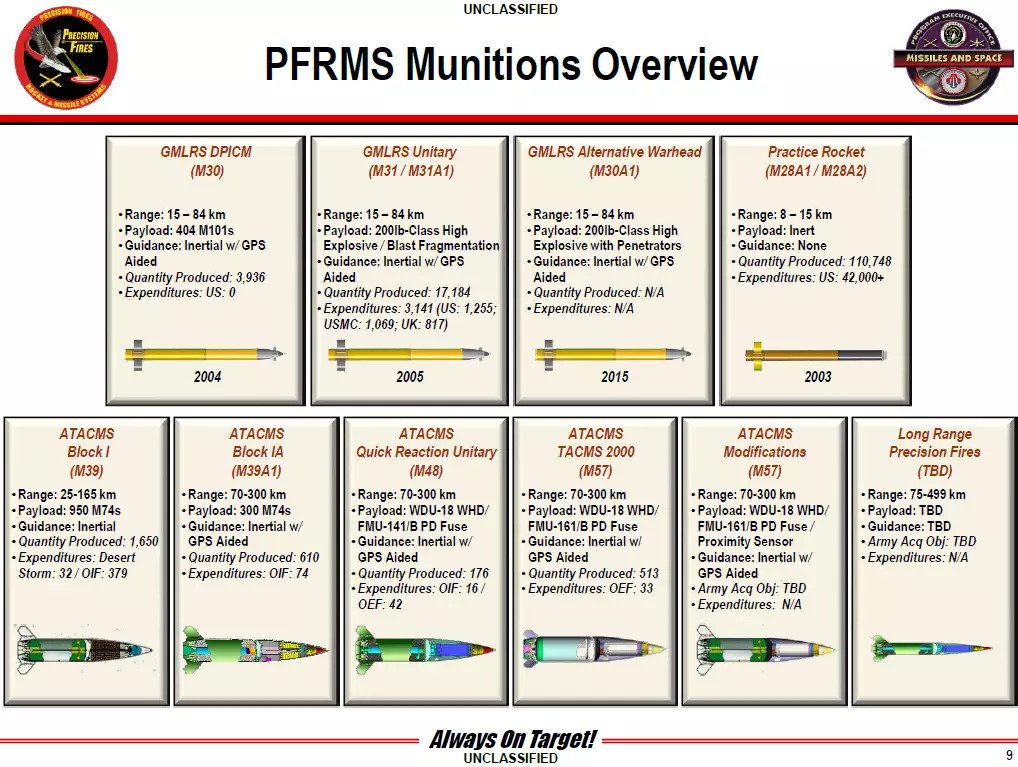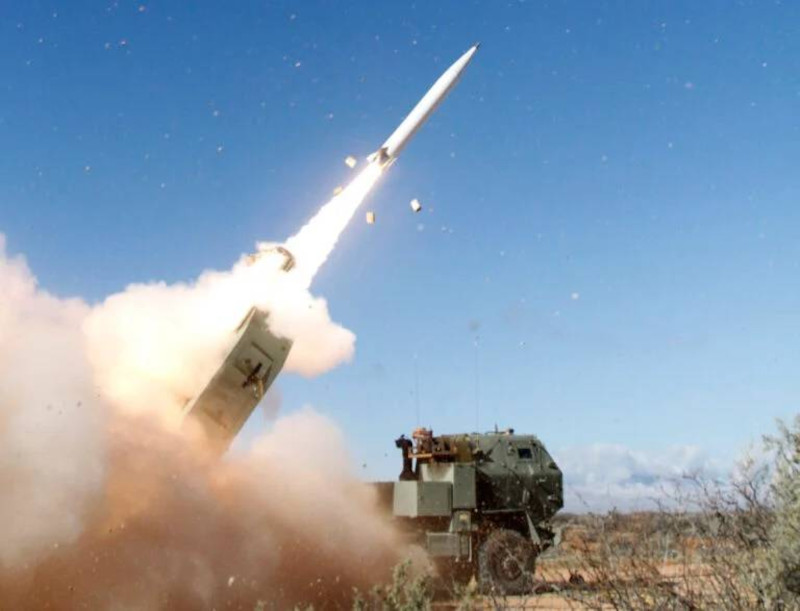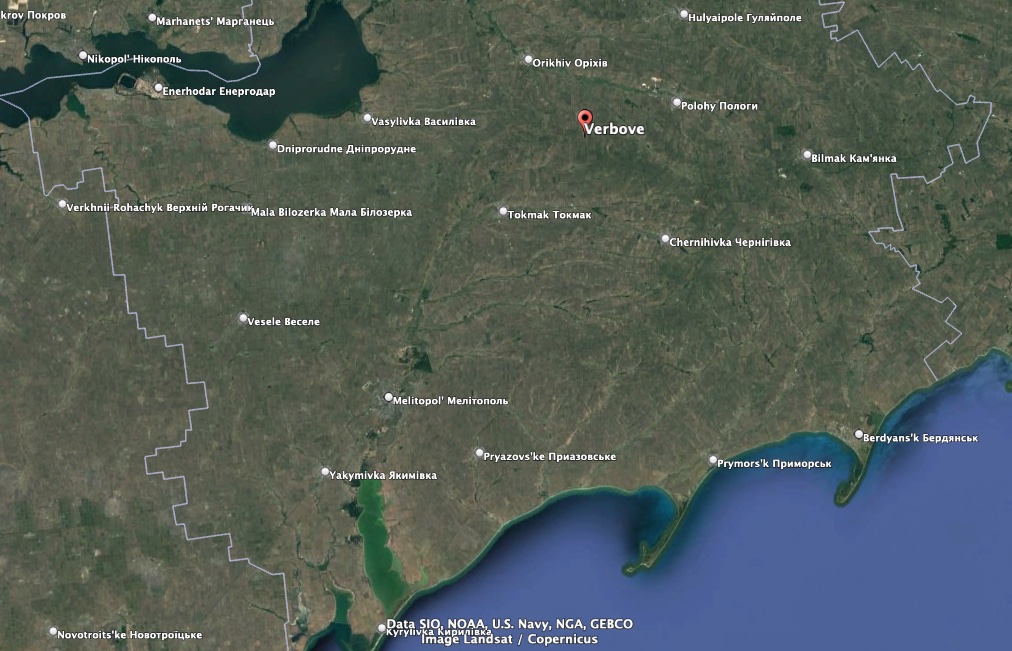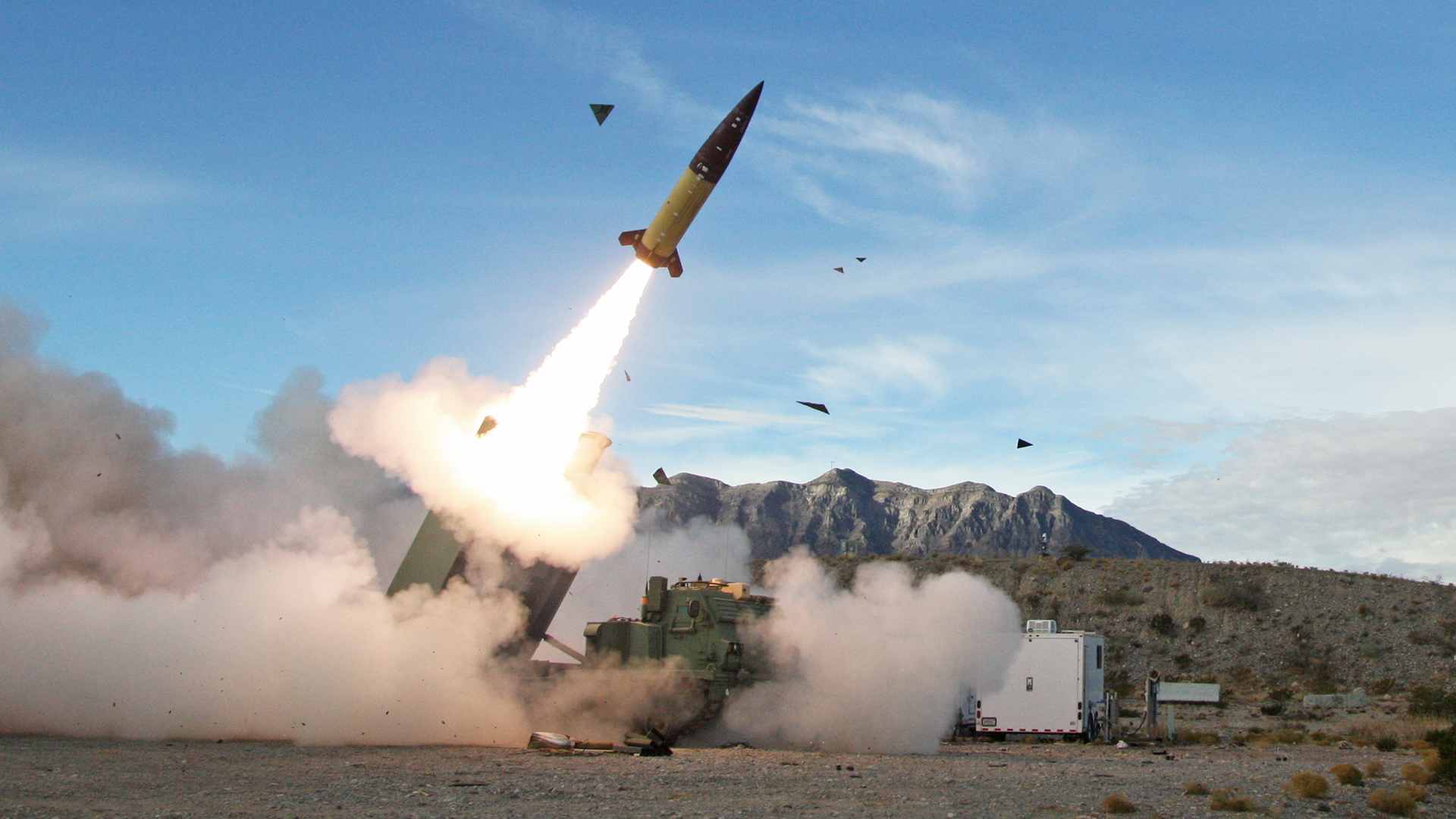It looks like Ukraine may just get at least a small number of Army Tactical Missile System (ATACMS) rounds after all.
Though not part of the latest aid package, announced yesterday, ATACMS were promised to Ukrainian President Volodymyr Zelensky during his visit this week to Washington by U.S. President Joe Biden, according to several media reports.
Biden told Zelensky that the U.S. “will provide a small number of long-range missiles to aid the war with Russia, three U.S. officials and a congressional official familiar with the discussions” told NBC News on Friday.
Those officials did not say when the missiles would be delivered or when a public announcement would be made, NBC News reported. However, a small number of ATACMS will be sent in coming weeks and more could be provided later, The Wall Street Journal reported.
The Biden administration is getting closer to deciding it will send Ukraine cluster munitions variants of the ATACMS, The Washington Post reported, citing “several people familiar with the ongoing deliberations.”
The U.S. has produced about 4,000 ATACMS of all variants, which include a unitary warhead version and several cluster munitions types, which you can read more about in our story here.

As we have reported frequently, there have been two main reasons Biden has yet to sign off on ATACMS. There is a concern that there are not enough in case the U.S. needs them during any future conflict. The Biden administration has also worried about further irking Russian President Vladimir Putin by providing a short-range ballistic missile that can strike fortified targets up to 200 miles away. The cluster variants can also deliver effects over a wide area against softer targets at similar ranges.
Some of the supply worries may be mitigated by the arrival next year of the the U.S. Army’s new Precision Strike Missile (PrSM), which was designed to replace ATACMS.
“…as PrSM Increment 1 comes on, it might make it less risky from a readiness standpoint to provide some number” of ATACMS to the Ukrainian armed forces, Douglas Bush, the Assistant Secretary of the Army for Acquisition, Logistics, and Technology, told reporters, including from The War Zone, earlier this week. You can read more about that in our story here.

Ukraine has long argued for ATACMS. In an exclusive interview with The War Zone that published today, Kyiv’s spy boss said they are needed to strike targets out of reach of Ukraine’s current weapons.
“The Russians just place command posts and other things beyond those distances so we don’t have anything to reach them there,” said Lt. Gen. Kyrylo Budanov. “And the situation is the same with Russian aviation at the airfields. Fighting Russian aviation using air defense systems is very costly and ineffective. Aviation should be taken out at the air bases.” You can read more insights from Budanov in our interview here.
The ATACMS promise is being touted as a big win for Zelensky. And in many ways it is. Given what Ukraine needs to accomplish fighting a deeply entrenched enemy with massive potential human resources, even a small number of ATACMS will help, especially against targets in Crimea.
They will not, however, change the battlefield status, especially in limited numbers. That is something Budanov pointed out to us, saying “conditionally that if it’s 100 missiles, this won’t change the situation.”
Ukraine, he added, needs “at least hundreds.”
U.S. officials acknowledged as well that ATACMS will be no silver bullet.
“The newly supplied missiles will help Ukraine’s cause, then, but they won’t prove a game-changing weapon,” U.S. officials told Politico.
All that said, some are better than none. And it might help Germany to decide to provide air-launched Taurus KEPD 350 cruise missiles with a stated range in excess of 310 miles according to manufacturer MBDA.
The War Zone could not confirm the multiple outlets’ reports that ATACMS will indeed be sent to Ukraine, but we will update you if or when we do.
Before we head into the latest from Ukraine, The War Zone readers can catch up on our previous rolling coverage here.
The Latest
On the battlefield, a top Ukrainian general said Friday that capturing the city of Tokmak, about 17 miles from the current front lines in Zapororizhzhia Oblast, is a key benchmark for the success of the counteroffensive.
“Tokmak is the minimum goal,” Gen. Oleksandr Tarnavsky told CNN. “The overall objective is to get to our state borders.”
As we reported yesterday, Ukraine has breached key defensive lines near the small town of Verbove. But Tarnavsky said the biggest breakthrough is yet to come.
“I think it will happen after Tokmak,” Tarnavsky said of the breakthrough. “At the moment they are relying on the depth of their defensive line there.”

Even more challenging than the so-called “Surovikin line” of minefields, anti-tank trenches and obstacles, are the “crossroads, tree lines and minefields between the tree lines.”
“[There’s] a combination of small harmful enemy defense groups that currently are planted very precisely and competently,” he said. “But the actions of our fighters force them to slowly pull back when they face our assault squads.”
So far, Ukraine has managed to advance about eight kilometers in this part of the battlefield, according to the Institute for the Study of War (ISW). On Thursday, the organization noted that Ukrainian mechanized units for the first time breached the main lines of defense in that sector of the battlefield.
However, that advance is tenuous and still heavily contested, according to both Ukraine and Russia.
“Ukrainian defenders successfully repelled an enemy attack in the vicinity of Robotyne,” the Ukrainian General Staff said Friday on its Facebook page. “The occupiers launched air strikes near Mala Tokmachka and Robotyne.”
Russian “air strikes and artillery fire defeated a cluster of manpower and hardware of the enemy near Robotyne and Verbove,” the Russian Defense Ministry said Friday on its Telegram channel.
In an hour-long exclusive in-depth interview with The War Zone from the hotel room while he stayed in Washington D.C., Budanov touched on a wide range of topics at great lengths beyond ATACMS. You can read more insights from Budanov in our interview here, but below are some of the highlights:
- Ukraine is “coming to the conclusion that we will have to change something” when it comes to the counteroffensive. “The conclusion is that we’ll need additional weapons systems and capabilities that could still change this balance we have today. Because looking at the situation solely from the perspective of manpower, if we compare the Ukrainian potential with Russian potential, the Russians have a lot more human resources. That is why we cannot keep on fighting just soldier on soldier. This will not deliver the results we want.”
- The Russians have committed all their reserves to defend against the counteroffensive and are suffering far more losses than Ukraine.
- The intensification of actions against Crimea might be an indicator that Ukraine still intends to retake Crimea this year.
- Ukraine’s attacks on Russian air defenses are designed to deplete stocks of interceptor missiles, open up coverage holes for fallow-on strikes, and to would Moscow’s ability to market its weaponry abroad.
- Abrams tanks should only be used “in a very tailored way for very specific, well-crafted operations because if they are used at the front line and just in a combined arms fight, they will not live very long on the battlefield.”
- The GUR “assisted” those who earlier this week carried out the sabotage attack on Chkalovsky Air Field, located less than 20 miles from Moscow.
- Ukraine will continue to strike at the Kerch Bridge and Putin “will get upset once again. What can he do?”
- Wagner boss Yevgeny Prigozhin might not be dead.
- Russian “military criminals” will be targeted around the globe.

After this trip to the U.S., Zelensky said that he worked out a “long-term agreement” with the Biden administration to jointly produce weapons.
“We will work together for Ukraine to produce the necessary weapons together with the United States,” Zelensky said in a video address to his nation, according to a translation by the official Ukrainian Ukrinform news outlet.
“This is a new level of our unity! Co-production in the defense industry with the United States is a historic thing. A new industrial base, new jobs for both our nations.”
The arrangement appears to center on “air defense systems,” though beyond that, Zelensky offered no details as to what kind, how many or where and when they will be produced. We reached out to the White House and Pentagon for comment and will update this story with any pertinent information provided.
“We are preparing to create a new defense ecosystem together with the United States to produce weapons to further reinforce freedom and the protection of life together,” said Zelensky. “This will yield global positive results. Thank you, Mr. President Biden!”

Earlier today, we told you about a Ukrainian missile attack on the headquarters of Russia’s Black Sea Fleet in Sevastopol, Crimea. You can read more about that in our initial coverage here.
Since then, new video has emerged of the cruise missile – a Storm Shadow or SCALP-EG – in the terminal phase of its attack as it descends on the building. At least one missile had already hit the structure when this one arrived.
New satellite imagery emerged on social media shows smoke rising from the headquarters building.
There are also unconfirmed reports that Russian Adm. Viktor Sokolov, commander of the Black Sea Fleet, was killed in the attack. So far, the Russian Defense Ministry has not made any statement about that and Ukrainians have made no official statements either.
In an interview with Voice of America, Budanov could not confirm that but said nine were killed and 16 injured including Col. Gen. Alexander Romanchuk and Lt. Gen. Oleg Tsekov.
The Commander and Chief of Staff of the Russian 58th Army was wounded during an attack on a military base in the occupied city of Melitopol, according to the Ukrainian Liga.net news outlet.
The attack occurred after the base was discovered at a local motor factory, the outlet reported. A Ukrainian missile strike destroyed it and wounded the commander, identified by Ukrainian sources as Lt. Gen. Denis Lyamin.
Several others were wounded in that attack as well, according to Liga.net.
Even as the fighting takes place elsewhere, Russia continues to bombard Ukrainian civilians in Kherson Oblast across the Dnipro River from the territory it still holds.
At least two civilians were killed today two were killed yesterday, Kherson Oblast Military Administration head Oleksandr Prokudin said on his Telegram channel.
It is certainly not news by now that pilots on both sides of this war have to fly low to stay under the radar and survive air defense systems. But it never gets old watching that in action, as is the case of this Ukrainian Su-24 Fencer strike jet zipping past Ukrainian armor troops just over the tree tops. You can hear from the voice of one of the soldiers that they too are impressed.
Small arms fire is no match for drones, as this Russian soldier – firing the borrowed rifle of a dead comrade in an attempt to destroy a Ukrainian drone – found out the hard way. The video is a stark reminder of how big of a threat drones are on the battlefield in Ukraine and how brutal war is.
Caution, this video is extremely graphic.
And finally, sometimes victories, even small ones, come far from the battlefield.
In a ceremony at the Ukrainian Embassy in Washington D.C. attended by Zelensky, U.S. officials returned to Ukraine cultural property stolen by Russia from the temporarily occupied territories, Zelensky’s office announced.
US Secretary of Homeland Security Alejandro Mayorkas, and Ambassador of Ukraine to the United States Oksana Markarova also attended.
Among the valuable items that were stolen during the occupation of Ukrainian territories are ancient Scythian swords, axes and pickaxes.
That’s it for now. We’ll update this story when there’s more news to report about Ukraine.
Contact the author: howard@thewarzone.com
